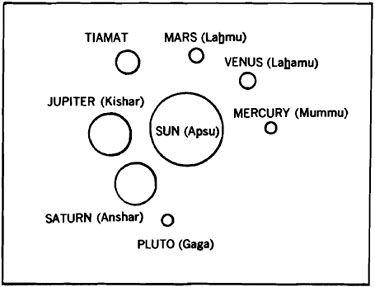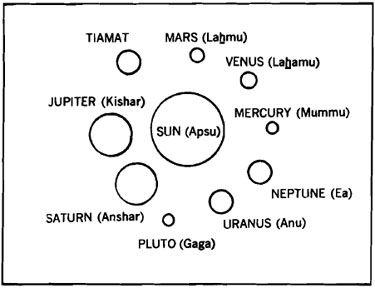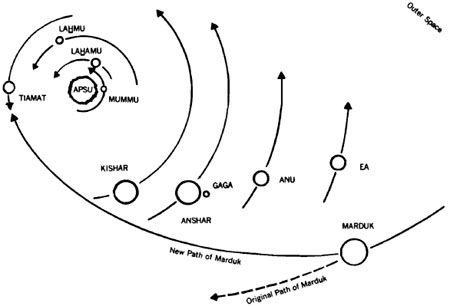The 12th Planet (35 page)
Authors: Zecharia Sitchin
Tags: #Non-Fiction, #Gnostic Dementia, #Fringe Science, #Retail, #Archaeology, #Ancient Aliens, #History

Fig. 103. II. The Inner Planets—the "gods in the midst"—come forth.

Fig. 104. III. The SHAR's—the giant planets—are created, together with their "emissary."

Fig. 105. IV. The last two planets are added—equal, in each other's image.
Where were Earth and the Moon? They were yet to be created, products of the forthcoming cosmic collision.
With the end of the majestic drama of the birth of the planets, the authors of the Creation epic now raise the curtain on Act II
,
on a drama of celestial turmoil. The newly created family of planets was far from being stable. The planets were gravitating toward each other; they were converging on Tiamat, disturbing and endangering the primordial bodies.
The divine brothers banded together;
They disturbed Tiamat as they surged back and forth.
They were troubling the "belly" of Tiamat
By their antics in the dwellings of heaven.
Apsu could not lessen their clamor;
Tiamat was speechless at their ways.
Their doings were loathsome. . ..
Troublesome were their ways.
We have here obvious references to erratic orbits. The new planets "surged back and forth"; they got too close to each other ("banded together"); they interfered with Tiamat's orbit; they got too close to her "belly"; their "ways" were troublesome. Though it was Tiamat that was principally endangered, Apsu, too, found the planets' ways "loathsome." He announced his intention to "destroy, wreck their ways." He huddled with Mummu, conferred with him in secret. But "whatever they had plotted between them" was overheard by the gods, and the plot to destroy them left them speechless. The only one who did not lose his wits was Ea. He devised a ploy to "pour sleep upon Apsu." When the other celestial gods liked the plan, Ea "drew a faithful map of the universe" and cast a divine spell upon the primeval waters of the solar system.
What was this "spell" or force exerted by "Ea" (the planet Neptune)—then the outermost planet—as it orbited the Sun and circled all the other planets? Did its own orbit around the Sun affect the Sun's magnetism and thus its radioactive outpourings? Or did Neptune itself emit, upon its creation, some vast radiations of energy? Whatever the effects were, the epic likened them to a "pouring of sleep"—a calming effect—upon Apsu (the Sun). Even "Mummu, the Counsellor, was powerless to stir."
As in the biblical tale of Samson and Delilah, the hero—overcome by sleep—could easily be robbed of his powers. Ea moved quickly to rob Apsu of his creative role. Quenching, it seems, the immense outpourings of primeval matter from the Sun, Ea/Neptune "pulled off Apsu's tiara, removed his cloak of aura." Apsu was "vanquished." Mummu could no longer roam about. He was "bound and left behind," a lifeless planet by his master's side.
By depriving the Sun of its creativity—stopping the process of emitting more energy and matter to form additional planets—the gods brought temporary peace to the solar system. The victory was further signified by changing the meaning and location of the Apsu. This epithet was henceforth to be applied to the "Abode of Ea." Any additional planets could henceforth come only from the new Apsu—from "the Deep"—the far reaches of space that the outermost planet faced.
How long was it before the celestial peace was broken once more? The epic does not say. But it does continue, with little pause, and raises the curtain on Act III:
In the Chamber of Fates, the place of Destinies,
A god was engendered, most able and wisest of gods;
In the heart of the Deep was MARDUK created.
A new celestial "god"—a new planet-now joins the cast. He was formed in the Deep, far out in space, in a zone where orbital motion—a planet's "destiny"—had been imparted to him. He was attracted to the solar system by the outermost planet: "He who begot him was Ea" (Neptune). The new planet was a sight to behold:
Alluring was his figure, sparkling the lift of his eyes;
Lordly was his gait, commanding as of olden times....
Greatly exalted was he above the gods, exceeding throughout....
He was the loftiest of the gods, surpassing was his height;
His members were enormous, he was exceedingly tall.
Appearing from outer space, Marduk was still a newborn planet, belching fire and emitting radiation. "When he moved his lips, fire blazed forth."
As Marduk neared the other planets, "they heaped upon him their awesome flashes," and he shone brightly, "clothed with the halo of ten gods." His approach thus stirred up electrical and other emissions from the other members of the solar system. And a single word here confirms our decipherment of the Creation epic:
Ten
celestial bodies awaited him—the Sun and only nine other planets.
The epic's narrative now takes us along Marduk's speeding course. He first passes by the planet that "begot" him, that pulled him into the solar system, the planet Ea/Neptune. As Marduk nears Neptune, the latter's gravitational pull on the newcomer grows in intensity. It rounds out Marduk's path, "making it good for its purpose."
Marduk must still have been in a very plastic stage at that time. As he passed by Ea/Neptune, the gravitational pull caused the side of Marduk to bulge, as though he had "a second head." No part of Marduk, however, was torn off at this passage; but as Marduk reached the vicinity of Anu/Uranus, chunks of matter began to tear away from him, resulting in the formation of four satellites of Marduk. "Anu brought forth and fashioned the four sides, consigned their power to the leader of the host." Called "winds," the four were thrust into a fast orbit around Marduk, "swirling as a whirlwind."
The order of passage—first by Neptune, then by Uranus—indicates that Marduk was coming into the solar system not in the system's orbital direction (counterclockwise) but from the opposite direction, moving clockwise. Moving on, the oncoming planet was soon seized by the immense gravitational and magnetic forces of the giant Anshar/Saturn, then Kishar/Jupiter. His path was bent even more inward—into the center of the solar system, toward Tiamat. (Fig. 106)
The approach of Marduk soon began to disturb Tiamat and the inner planets (Mars, Venus, Mercury). "He produced streams, disturbed Tiamat; the gods were not at rest, carried as in a storm."
Though the lines of the ancient text were partially damaged here, we can still read that the nearing planet "diluted their vitals ... pinched their eyes." Tiamat herself "paced about distraught"—her orbit, evidently, disturbed.
The gravitational pull of the large approaching planet soon began to tear away parts of Tiamat. From her midst there emerged eleven "monsters," a "growling, raging" throng of satellites who "separated themselves" from her body and "marched at the side of Tiamat." Preparing herself to face the onrushing Marduk, Tiamat "crowned them with halos," giving them the appearance of "gods" (planets).
Of particular importance to the epic and to Mesopotamian cosmogony was Tiamat's chief satellite, who was named KINGU, "the first-born among the gods who formed her assembly."
She exalted Kingu,
In their midst she made him great....
The high command of the battle
She entrusted into his hand.

Fig. 106
Subjected to conflicting gravitational pulls, this large satellite of Tiamat began to shift toward Marduk. It was this granting to Kingu of a Tablet of Destinies—a planetary path of his own—that especially upset the outer planets. Who had granted Tiamat the right to bring forth new planets? Ea asked. He took the problem to Anshar, the giant Saturn.
All that Tiamat had plotted, to him he repeated:
"... she has set up an Assembly and is furious with rage.
she has added matchless weapons, has borne monster-gods.
withal eleven of this kind she has brought forth;
from among the gods who formed her Assembly,
she has elevated Kingu, her first-born, made him chief ...
she has given him a Tablet of Destinies, fastened it
on his breast."
Turning to Ea, Anshar asked him whether he could go to slay Kingu. The reply is lost due to a break in the tablets; but apparently Ea did not satisfy Anshar, for the continuing narrative has Anshar turning to Anu (Uranus) to find out whether he would "go and stand up to Tiamat." But Anu "was unable to face her and turned back."
In the agitated heavens, a confrontation builds; one god after another steps aside. Will no one do battle with the raging Tiamat?
Marduk, having passed Neptune and Uranus, is now nearing Anshar (Saturn) and his extended rings. This gives Anshar an idea: "He who is potent shall be our Avenger; he who is keen in battle: Marduk, the Hero!" Coming within reach of Saturn's rings ("he kissed the lips of Anshar"), Marduk answers:
"If I, indeed, as your Avenger
Am to vanquish Tiamat, save your lives–
